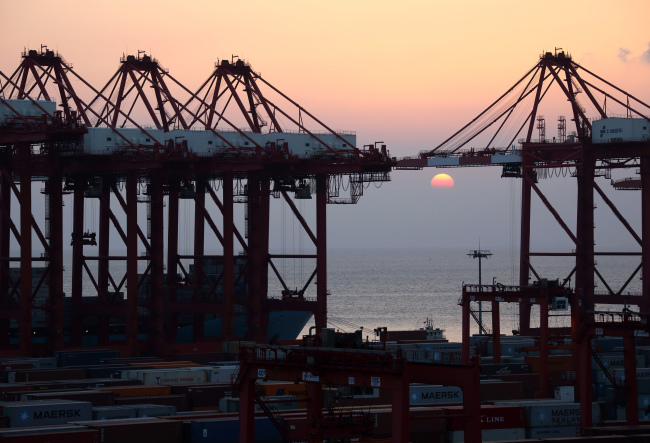BEIJING (AFP) ― China’s inflation rate dropped to 2 percent year-on-year in February, down from 2.5 percent in January, the government said Sunday, prompting economists to warn that the risk of deflation was rising.
The consumer price index figure announced by the National Bureau of Statistics matched the median forecast in a poll of 13 economists by Dow Jones Newswires.
The producer price index, which measures costs for goods at the factory gate, declined by 2 percent in February, accelerating from January’s 1.6 percent fall, the NBS said.
Economists from ANZ bank wrote in an analysis that PPI had been negative for two years and “the risk of deflation is rising in the near term.”
The consumer price index figure announced by the National Bureau of Statistics matched the median forecast in a poll of 13 economists by Dow Jones Newswires.
The producer price index, which measures costs for goods at the factory gate, declined by 2 percent in February, accelerating from January’s 1.6 percent fall, the NBS said.
Economists from ANZ bank wrote in an analysis that PPI had been negative for two years and “the risk of deflation is rising in the near term.”

Falling prices are seen as potentially bad by economists as they encourage consumers to put off spending and companies to delay investment, both of which act as brakes on growth, although they leave room for more stimulus measures by authorities.
China is the world’s second-largest economy and a key driver of global growth. Its gross domestic product expanded 7.7 percent last year, the same as in 2012 ― which was the slowest rate of growth since 1999’s 7.6 percent.
The last time expansion was any lower was in 1990, when it was measured at 3.8 percent.
Premier Li Keqiang set a target of “around 7.5 percent” for growth in 2014 in a speech to China’s National People’s Congress last week.
The inflation statistics came a day after Customs said that China recorded an unexpected trade deficit of $22.98 billion in February.
“Yesterday’s trade figures also reinforced the view that China’s growth momentum continues to slow down,” the ANZ economists said, adding that consumption over China’s Lunar New Year festival period had been soft, “partly due to fiscal austerity and anti-corruption efforts by the Chinese authorities.”
“GDP growth in the first half of 2014 will likely be below 7.5 percent, which could trigger further policy easing over the foreseeable future,” they said.
Food prices ― which often increase during the Lunar New Year, which fell mostly in February this year ― went up by only 2.7 percent, the NBS said, although the figure included wide variations, with pork prices falling 8.7 percent while fresh fruit went up 19.7 percent.
China’s CPI, a main gauge of inflation, rose by 2.6 percent in 2013, unchanged from 2012 and well below the 3.5 percent target set by the government in the world’s second-biggest economy.
Premier Li set an unchanged inflation goal for this year in his speech.
Inflation in China has slowed markedly since 2011, when annual CPI spiked to 5.4 percent, and maintaining growth in the face of domestic and overseas economic woes has since become a higher priority for Beijing.
-
Articles by Korea Herald










![[Hello India] Hyundai Motor vows to boost 'clean mobility' in India](http://res.heraldm.com/phpwas/restmb_idxmake.php?idx=644&simg=/content/image/2024/04/25/20240425050672_0.jpg&u=)








